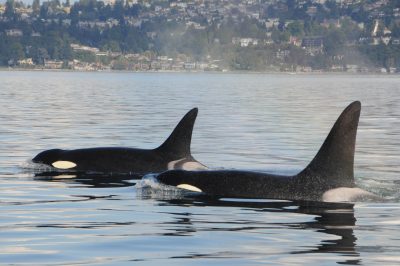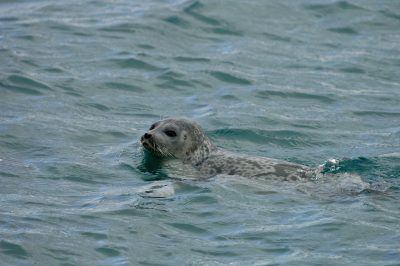 Congratulations to Dr. Andrew Trites, professor in the UBC Institute for the Oceans and Fisheries and Director of its Marine Mammal Research Unit, who has won UBC’s President’s Award for Public Education through Media.
Congratulations to Dr. Andrew Trites, professor in the UBC Institute for the Oceans and Fisheries and Director of its Marine Mammal Research Unit, who has won UBC’s President’s Award for Public Education through Media.
Dr. Trites regularly communicates, in both official languages, with domestic and international media about his marine mammal research – be it whales, seals, or sea lions – through interviews, informed comments, op-eds, social media, and speaking events. Dr. Trites is the ‘go to’ guy, answering hundreds of media calls and enquiries each year. After all, he has been studying marine mammal for over 30 years, and even brought the “Big Blue” blue whale skeleton to UBC.
In recent years, there has been a large uptake in media coverage of issues related to killer whales, such as the UBC discovery of a possible new ocean population off the Pacific coast; the stranded calf that rescuers and researchers were trying to reunite with its pod, the declining Southern Resident killer whale population, food and energy intake for resident and transient orcas, or, their unprecedented ability to sink yachts near Gibraltar and in the Mediterranean Sea. Dr. Trites has been called upon to provide insights and explanations about all of these issues. He is also the person called upon to discuss sea lions’ and seals’ predator-prey activities, diving and foraging practices, whelping and pupping practices, possible cull arguments, and their propensity to hang out on beaches on Vancouver Island — even after they have been moved to other spots. And then there are the humpback whales that get tangled in fish farm nets, the new Guadalupe fur seal haul out, grey whale decline, and his recent work on South American manatees. Marine mammals around the world are keeping him very busy.

Southern Resident killer whales. Photo: Josh McInnes
Why did you want to be nominated for this award?
I have always believed that effective research must go beyond discovery — and that we must engage with the media to share our knowledge in ways that benefits society and furthers marine conservation. This award affirms my commitment and that of many others at UBC to connect the wider community with our research and knowledge — and brings greater attention to the value that UBC places on educating the public through media.

Steller sea lions. (©Andrew Trites)
How important do you think it is to educate the public about marine issues?
Educating the public about marine issues has never been more important than now, given the rapid pace of changes underway throughout all the world’s oceans. Unfortunately, most people struggle to connect with the ocean when its hidden world lies beyond their view. However, I have found that the widespread fascination that people have with marine mammals has been an effective means to bridge this gap — and spark curiosity, initiate public discourse and influence public policy.
Which marine mammal story do you feel was the most important?
Some of the most impactful stories have come from everyday people who, with their cell phones in hand, captured unexpected encounters with dolphins, humpback whales, grey whales, and killer whales — whether while walking the seawall, taking a ferry, sitting on the shore, or riding a hydrofoil. These moments have been entry points for me to hold broader conversations with radio, television, newspapers, and online media; going beyond the initial event to explore why these sightings occur and why protecting these marine species and their habitats is so important. They have all served as powerful openings for meaningful discussions that can influence public awareness and policy.

Canadian ringed seal (©Marie Auger-Méthé.)
How excited are you by this win?
I think this award underscores the importance of making UBC’s scientific knowledge accessible to the public — and the value of working with media to support conservation efforts and public education. I am incredibly honored and proud to be recognized by UBC for my expertise in marine mammal research, and for my dedication to science communication. I could not be happier.
I feel grateful to be part of a research community that values outreach and media engagement, and am particularly thankful for the continual support that I and others receive at UBC from our communications team at the IOF, the Faculty of Science and Media Relations. It is a team effort, and one that I am very proud to be part of.
Congratulations, Dr. Trites.
Tags: Andrew Trites, awards, blue whale, grey whales, Guadalupe fur seals, humpback whales, killer whales, manatees, marine mammals, MMRU, science communications, sea lions, seals, whales